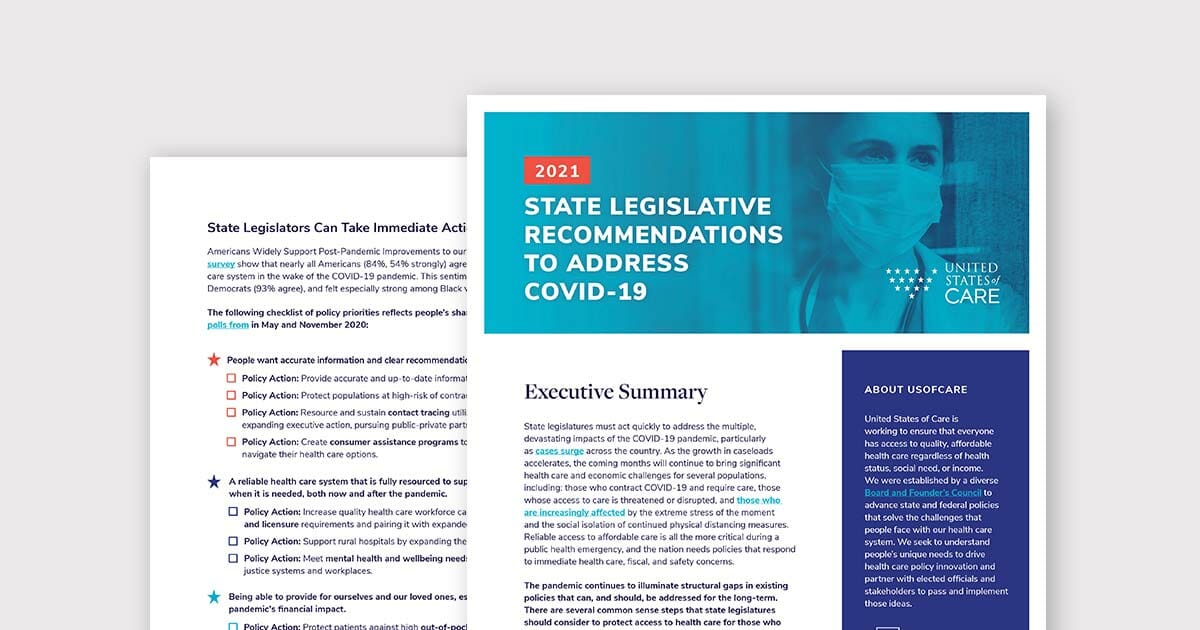COVID-19, State Efforts
2021 State Legislative Recommendations to Address COVID-19

Executive Summary
State legislatures must act quickly to address the multiple, devastating impacts of the COVID-19 pandemic, particularly as cases surge across the country. As the growth in caseloads accelerates, the coming months will continue to bring significant health care and economic challenges for several populations, including: those who contract COVID-19 and require care, those whose access to care is threatened or disrupted, and those who are increasingly affected by the extreme stress of the moment and the social isolation of continued physical distancing measures. Reliable access to affordable care is all the more critical during a public health emergency, and the nation needs policies that respond to immediate health care, fiscal, and safety concerns.
The pandemic continues to illuminate structural gaps in existing policies that can, and should, be addressed for the long-term. There are several common sense steps that state legislatures should consider to protect access to health care for those who need it, which are outlined below and updated from our May 2020 recommendations. While states made progress to combat COVID-19 and protect their residents during their 2020 legislative sessions, many legislatures’ sessions were cut short and more work remains. This document seeks to provide state legislators with a menu of policies that should be considered immediately upon returning to session in 2021.
The list reflects what we are seeing in public opinion polling and what we are hearing directly from Americans through our community conversations. It also complements the recommendations we have provided to the incoming Biden Administration, Congress and best practices we have elevated in states.
State Legislators Can Take Immediate Action
Americans Widely Support Post-Pandemic Improvements to our Health Care System. The data from our national survey show that nearly all Americans (84%, 54% strongly) agree that we must build a better, more equitable health care system in the wake of the COVID-19 pandemic. This sentiment is shared by Republicans (71% agree) and Democrats (93% agree), and felt especially strong among Black voters (94% agree).
The following checklist of policy priorities reflects people’s shared needs based on national United States of Care polls from in May and November 2020:
People want accurate information and clear recommendations on the virus and how to stay healthy and safe.
- Policy Action: Provide accurate and up-to-date information.
- Policy Action: Protect populations at high-risk of contracting COVID-19 with safe care and shelter.
- Policy Action: Resource and sustain contact tracing utilizing existing programs in state health departments, expanding executive action, pursuing public-private partnerships, and/or app-based solutions.
- Policy Action: Create consumer assistance programs to help people facing disruptions in coverage navigate their health care options.
A reliable health care system that is fully resourced to support essential workers and available to people when it is needed, both now and after the pandemic.
- Policy Action: Increase quality health care workforce capacity by extending waivers for scope of practice and licensure requirements and pairing it with expanded training and assessment.
- Policy Action: Support rural hospitals by expanding their access to funding.
- Policy Action: Meet mental health and wellbeing needs with solutions focused on health care, education, justice systems and workplaces.
Being able to provide for ourselves and our loved ones, especially as we are worried about the pandemic’s financial impact.
- Policy Action: Protect patients against high out-of-pocket costs.
- Policy Action: Expand access to virtual care services for people with all coverage types.
- Policy Action: Extend Medicaid coverage for new moms to address disparities and remove financial barriers to care.
- Policy Action: Ensure insulin is affordable for a population at greater risk for serious COVID-19 complications.
A health care system that cares for everyone, including people who are vulnerable and those who were already struggling before the pandemic hit.
- Policy Action: Establish state coordinated data collection to address needs and gaps, especially in vulnerable and minority communities.
- Policy Action: Adopt a comprehensive approach to people’s overall health by addressing social determinants of health through Medicaid programs.